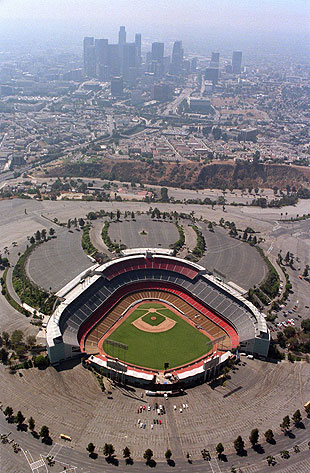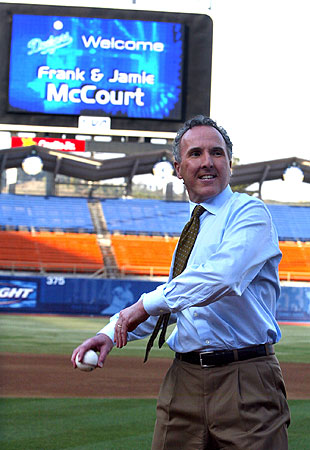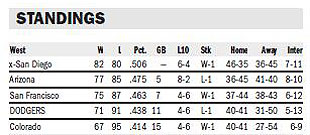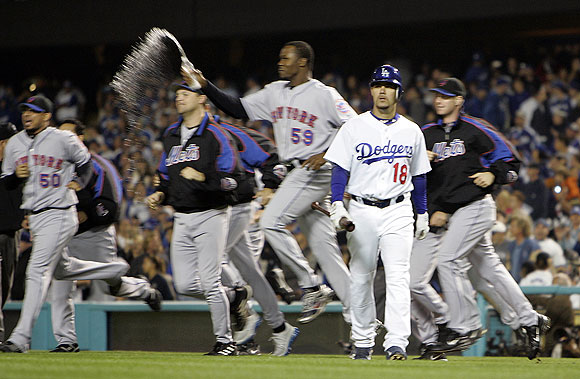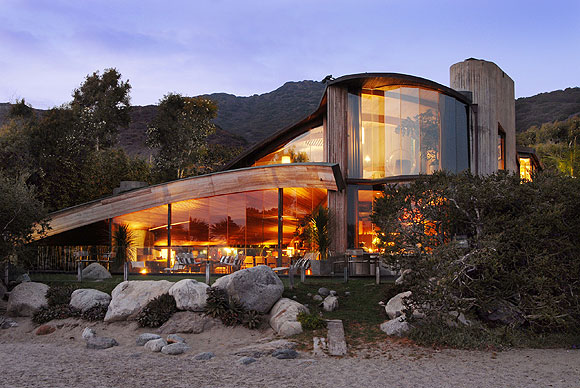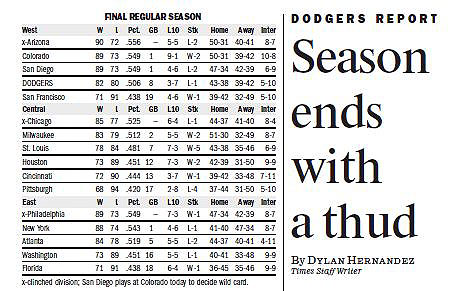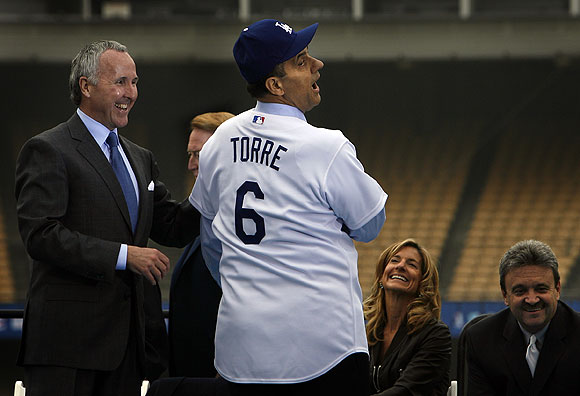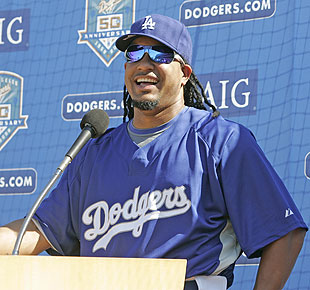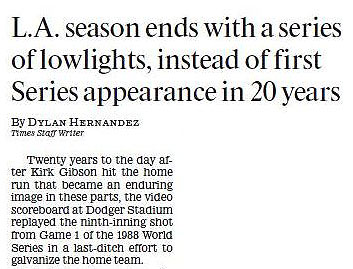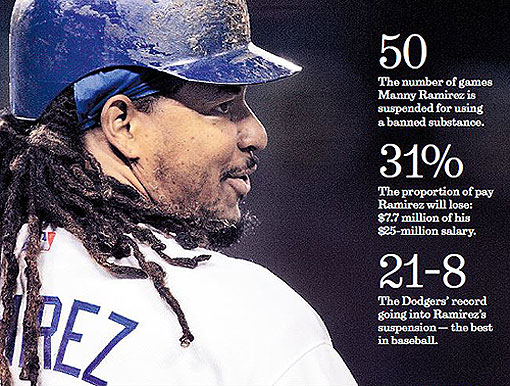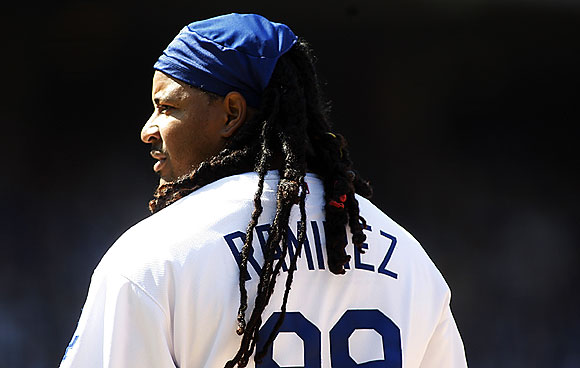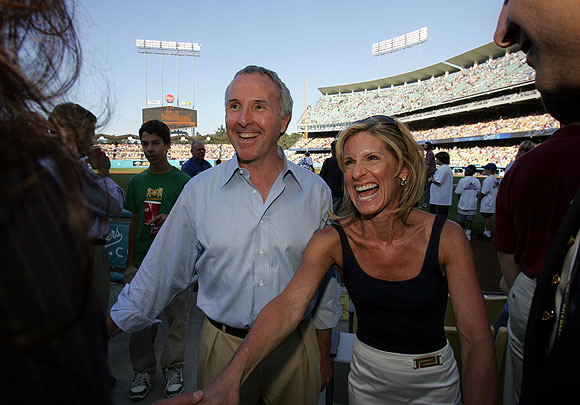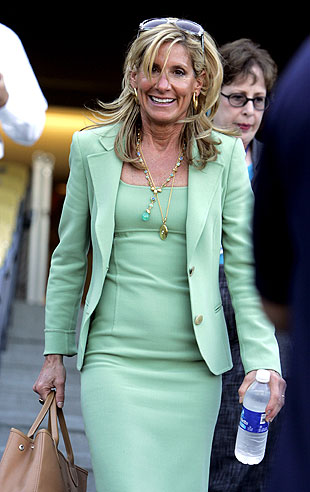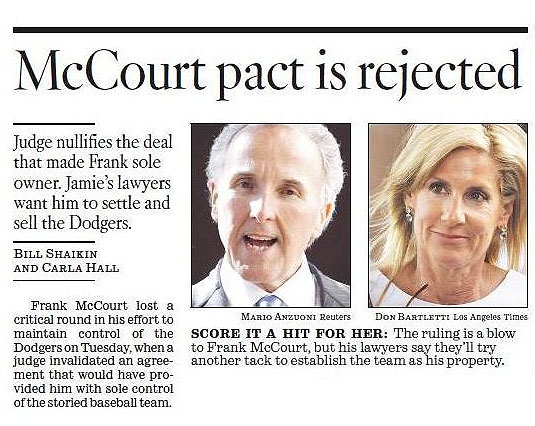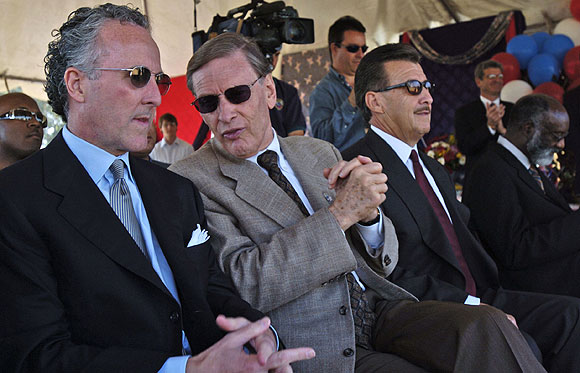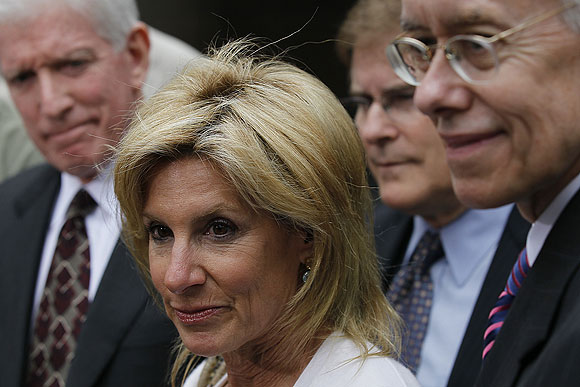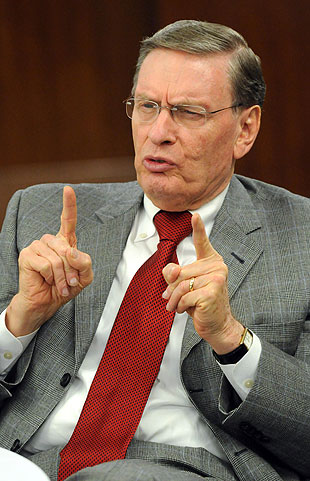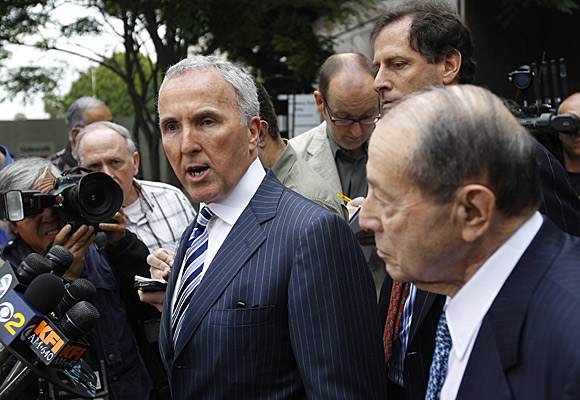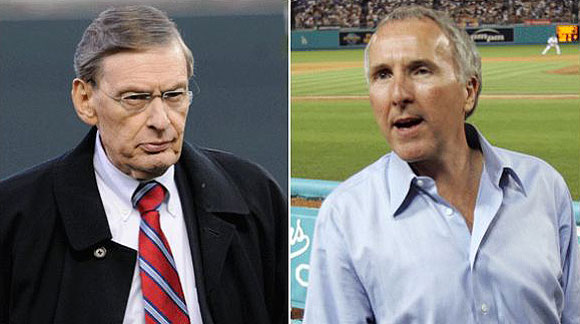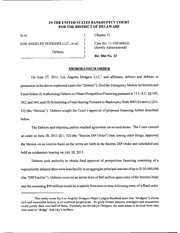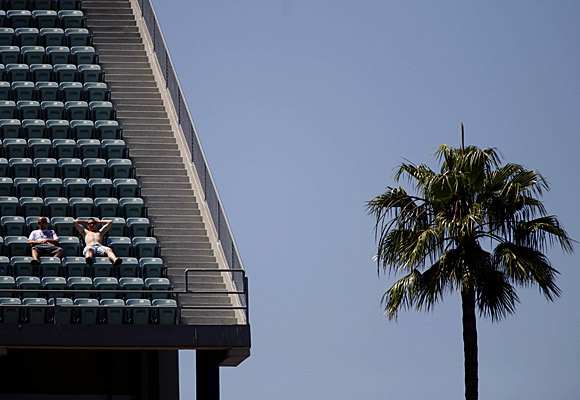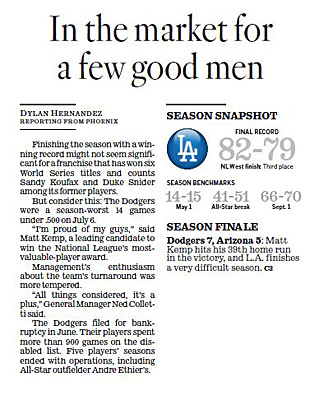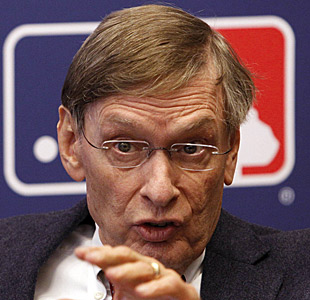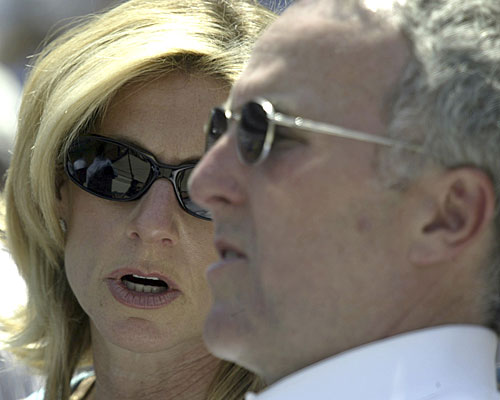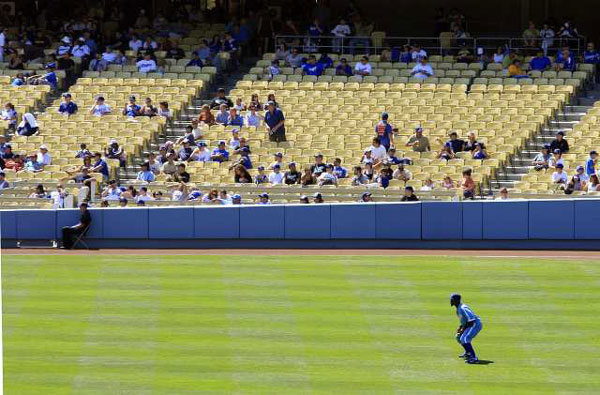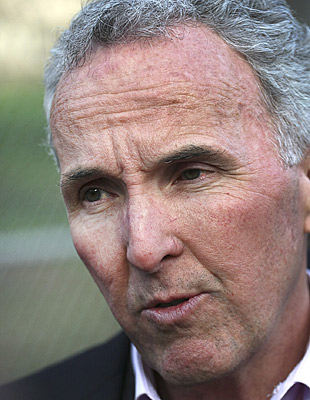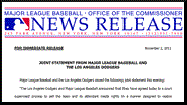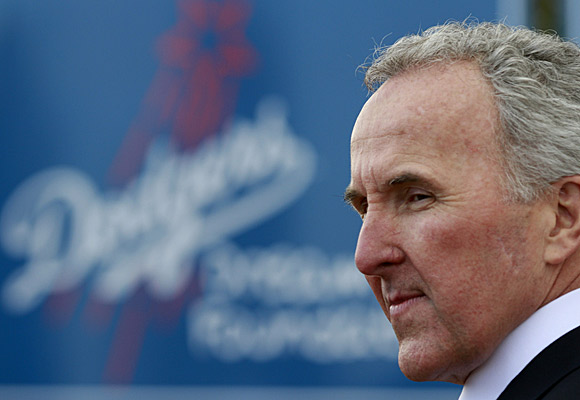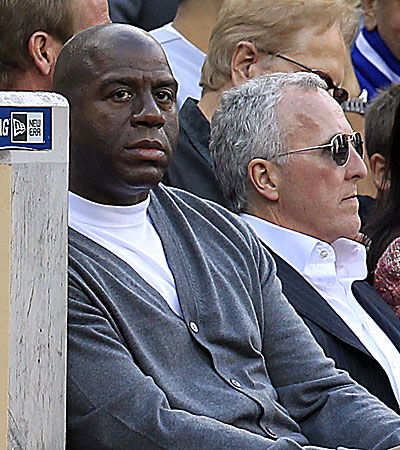The McCourts and the Dodgers
Boston parking magnate Frank McCourt and the Los Angeles Dodgers looked like a happy match when the team bagged its new owner a National League West championship in 2004. Three years later, the acquisition of respected manager Joe Torre and dazzling slugger Manny Ramirez promised a bright new chapter in the Dodger story — until summer romance gave way to Greek tragedy.
On March 27, a group led by Lakers great Magic Johnson agreed to pay $2 billion for the team — a record price for a sports franchise.
News Corp. agrees in principle to sell the Dodgers to Boston real estate developer Frank H. McCourt. The media giant bought the team from the O’Malley family in 1998 for a then-record sum of $311 million. After pouring in an additional $200 million trying to field a successful team and to renovate Dodger Stadium, News Corp. asserts that it never made a profit, losing about $40 million a year.
Major League Baseball unanimously approves News Corp.’s sale of the Dodgers to Frank McCourt for $430 million. It is a leveraged deal financed mostly by debt. McCourt’s attorney Steve Susman says at a divorce trial in 2010 that McCourt put “not a penny” of his own cash into the deal. In McCourt’s first season, the Dodgers win 93 games and the National League West title for the first time since 1995.
Frank and Jamie McCourt buy a $21-million Brentwood mansion. Presaging a splurge of outsized spending, they next buy the house next door to use mostly as staging for an $8-million project to build an indoor pool and sauna. Later, court filings would show that the couple financed their lavish lifestyle by turning the Dodgers organization into their personal ATM. The houses are recorded in Jamie’s name, a fact that would later play out in divorce court when Frank claims sole ownership of the Dodgers, saying the couple’s houses belong to Jamie.
After winning the National League wild-card spot with an 88-74 record, the Dodgers are swept by the New York Mets in the first round of the playoffs.
Frank McCourt buys a trophy house in Malibu — a glass landmark by architect John Lautner with a $27-million price tag — and then doubles up with the $19-million house next door, building a small replica of his much less pricey Cape Cod estate. A warning from his finance manager that borrowing from the Dodgers for the purchase of the second Malibu residence is “disconcerting/discouraging and something I think we should try very hard to avoid,” goes unheeded.
Grady Little resigns as manager of the Dodgers and is replaced by former New York Yankees manager Joe Torre.
Manny Ramirez, the Dodgers’ most talented and most popular player, is banned from baseball for 50 games after flunking a drug test. Ramirez, whose effervescent attitude and lethal bat had made him the face of this storied franchise, is labeled a cheater before a largely adoring fan base at Dodger Stadium.
On the eve of Game 1 of the NLCS against the Phillies, Frank and Jamie McCourt announce that they are separating after nearly 30 years of marriage. No reason is given for the separation. The announcement overshadows the fact that the Dodgers are playing in the NLCS in consecutive seasons for the first time since 1977-78.
The Dodgers Dream Foundation comes under investigation by the California attorney general’s office for payments it made to club executive Howard Sunkin. According to tax returns, Sunkin, the charity’s chief executive, earned a salary of nearly $400,000 in 2007, almost a quarter of the foundation’s budget.
The judge in the divorce case invalidates the postnuptial marital property agreement that Frank McCourt claimed provided him with sole ownership of the Dodgers. In the wake of this decision, McCourt’s lawyers say he will use other legal avenues to establish his sole ownership of the Dodgers, while Jamie McCourt’s lawyers say she will be confirmed as the co-owner of the team as community property of their marriage.
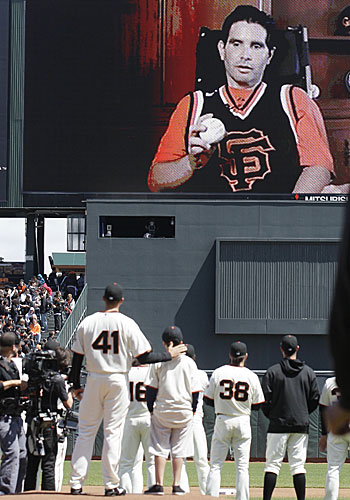
Giants fan Bryan Stow is attacked in the Dodger Stadium parking lot after the Dodgers’ opener against the San Francisco Giants. Stowe, wearing Giants attire, is attacked from behind by two men. Stow is in a coma for weeks and suffers brain damage.
Frank and Jamie McCourt announce that they have come to an agreement over ownership of the team and terms of the divorce, with contingencies. The first of those is that Bud Selig must approve a long-term television contract between the Dodgers and Fox. Read the court settlement.
The Dodgers, with a payroll of an estimated $30 million due at the end of the week, file for bankruptcy protection, further throwing the ownership of the team into question. Read the bankruptcy filing.
A bankruptcy judge rules that Frank McCourt cannot use a loan he arranged to run the Dodgers for the rest of the season. Read the judge’s ruling.
Frank McCourt agrees to sell the Dodgers, abruptly surrendering the team after fighting to retain it over two years and in two courts.
McCourt and Major League Baseball agree to seek approval from the U.S. Bankruptcy Court for an auction of the Dodgers. The sale is expected to include the team, Dodger Stadium and the surrounding parking lots, a package bought by McCourt for $421 million in 2004 and likely to sell for two to three times as much now.
The league hopes a new Dodgers owner can be in place by opening day.

Dodgers bidders are cut to three. The finalists: a group led by hedge-fund billionaire Steven Cohen and Los Angeles billionaire and philanthropist Patrick Soon-Shiong; a group led by Magic Johnson and veteran baseball executive Stan Kasten; and St. Louis Rams owner Stan Kroenke.
The parties eliminated: a partnership between Memphis Grizzlies owner Michael Heisley and Los Angeles investor Tony Ressler; and a bid by Stanley Gold and the family of the late Roy Disney.
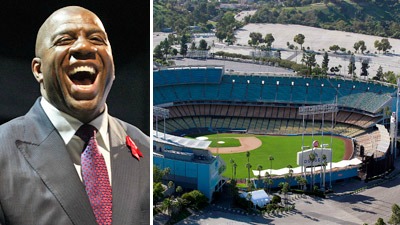
A group led by Lakers legend Magic Johnson agrees to pay $2 billion for the Dodgers, a record price for a sports franchise if the sale is approved. In addition, owner Frank McCourt and “certain affiliates of the purchasers” would buy the land surrounding Dodger Stadium for $150 million.
Sources: Times research
Credits: Megan Garvey, Houston Mitchell, Maloy Moore, Ben Welsh, TimelineSetter
